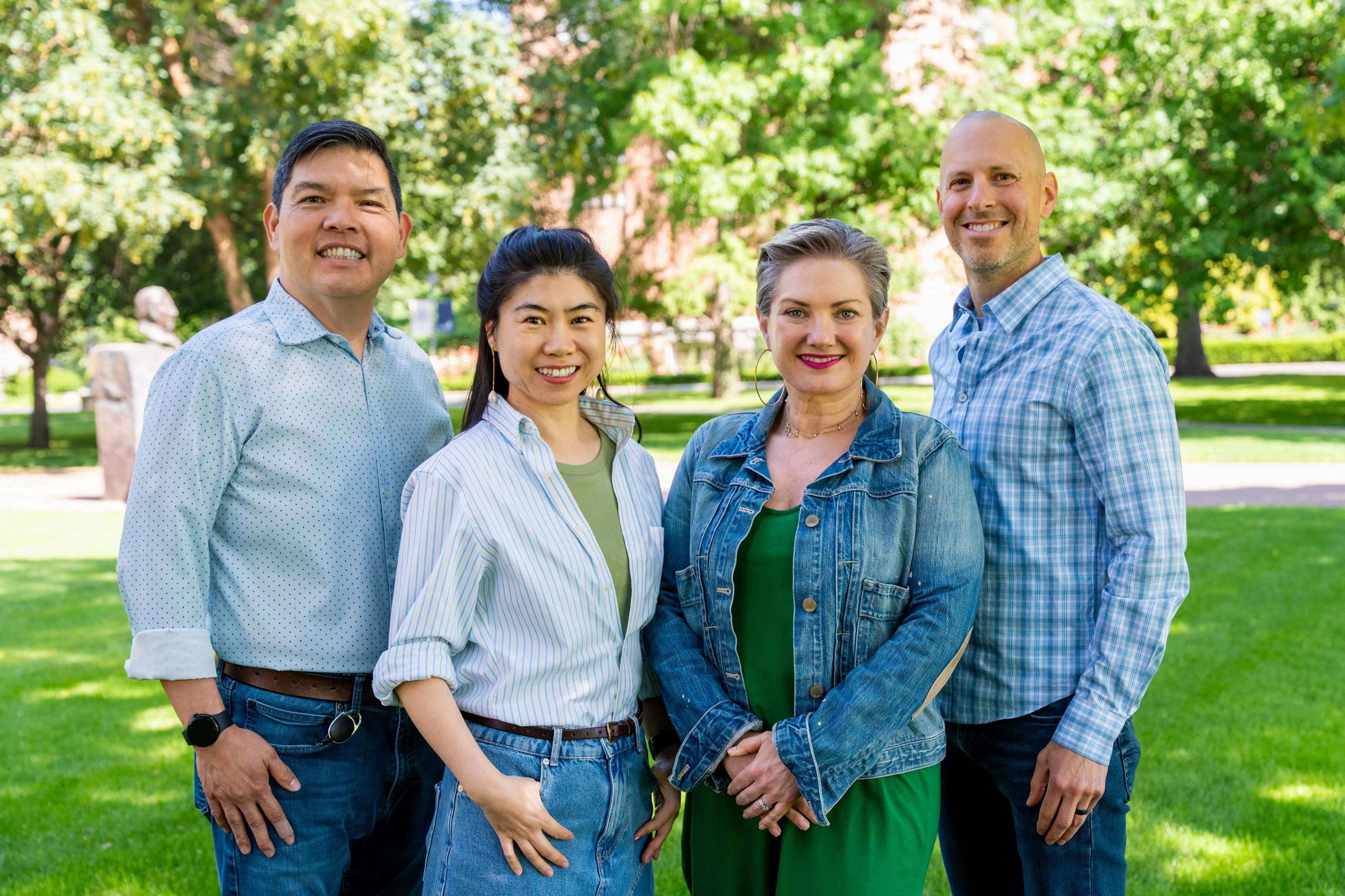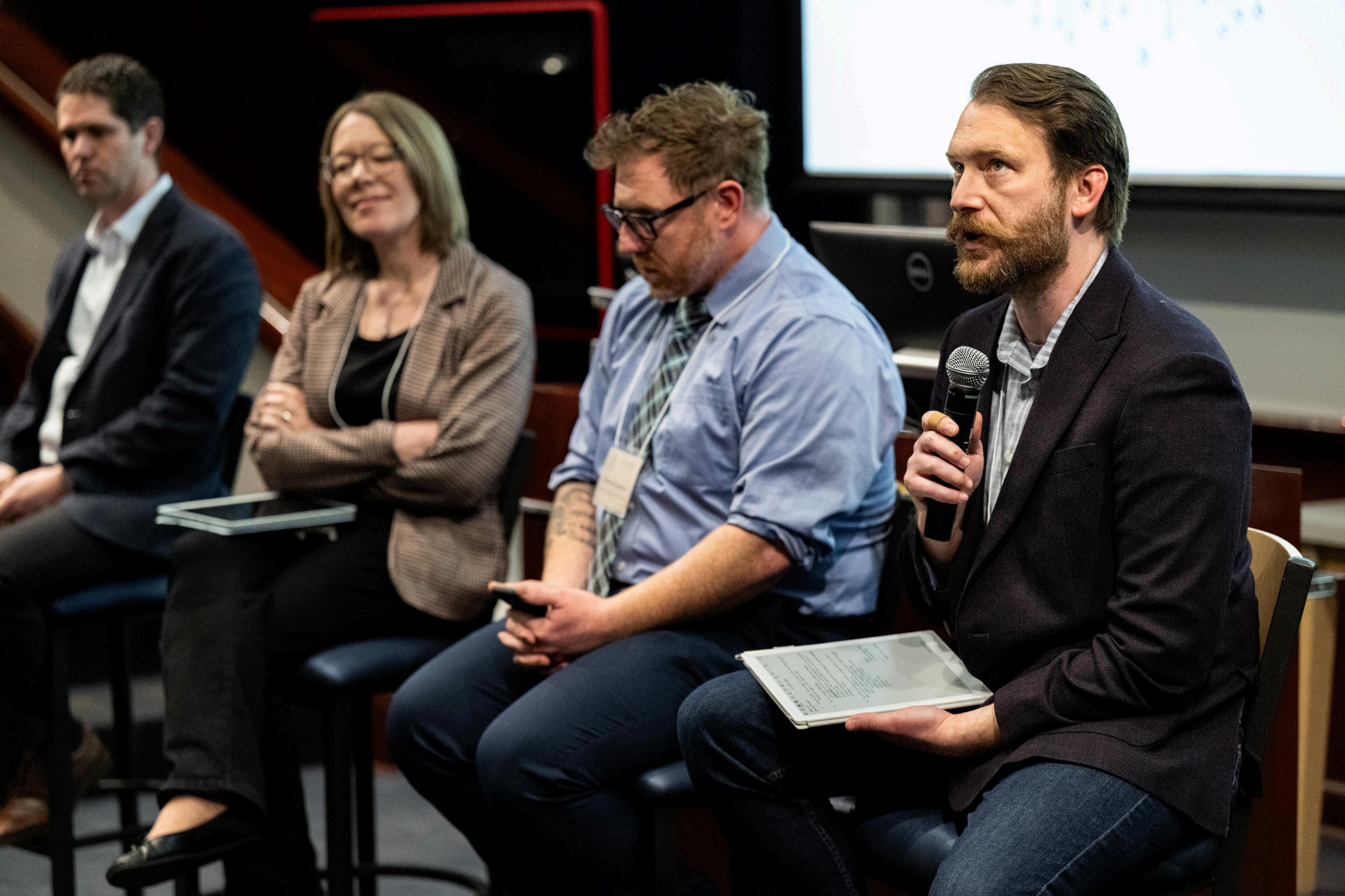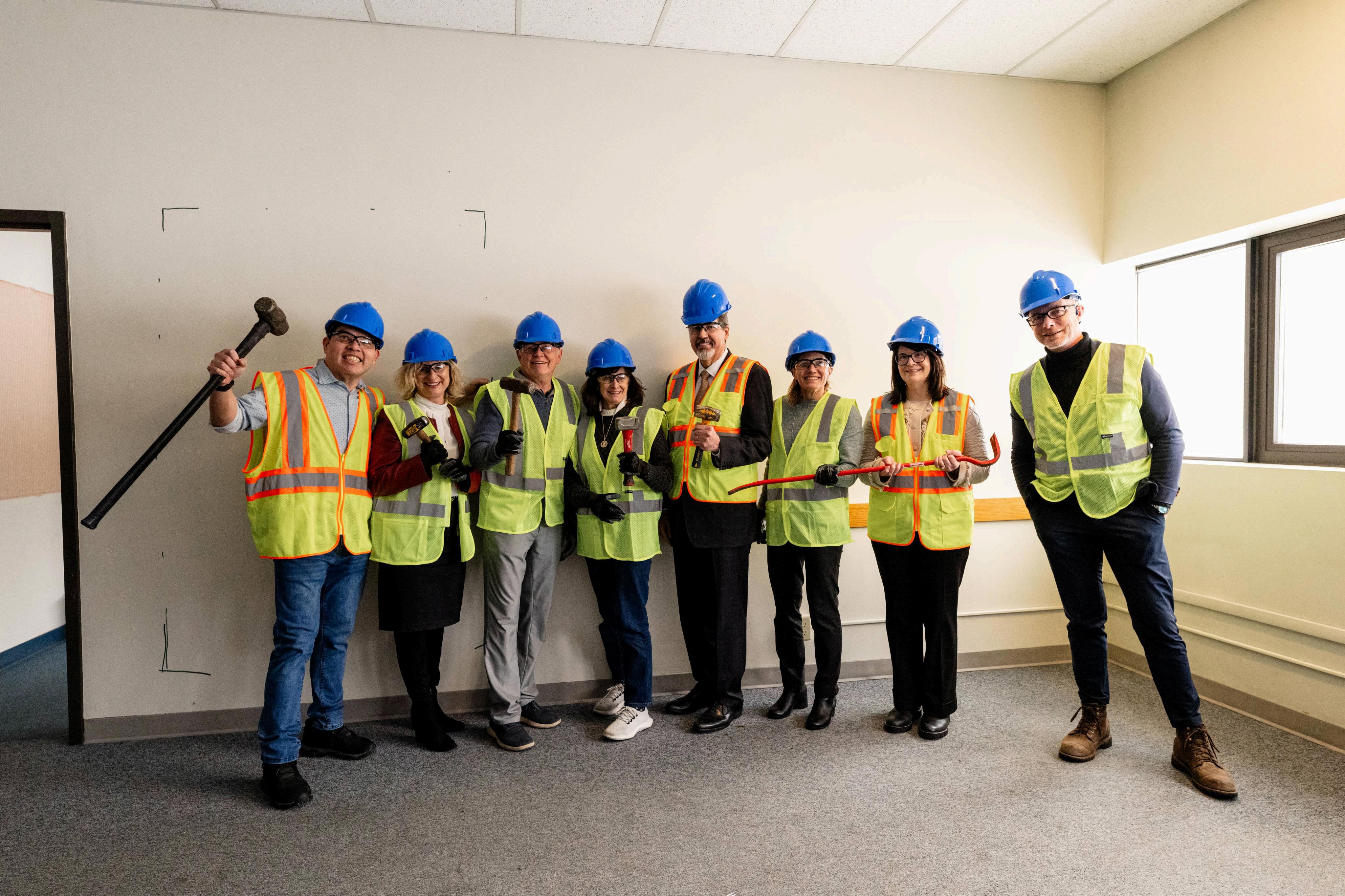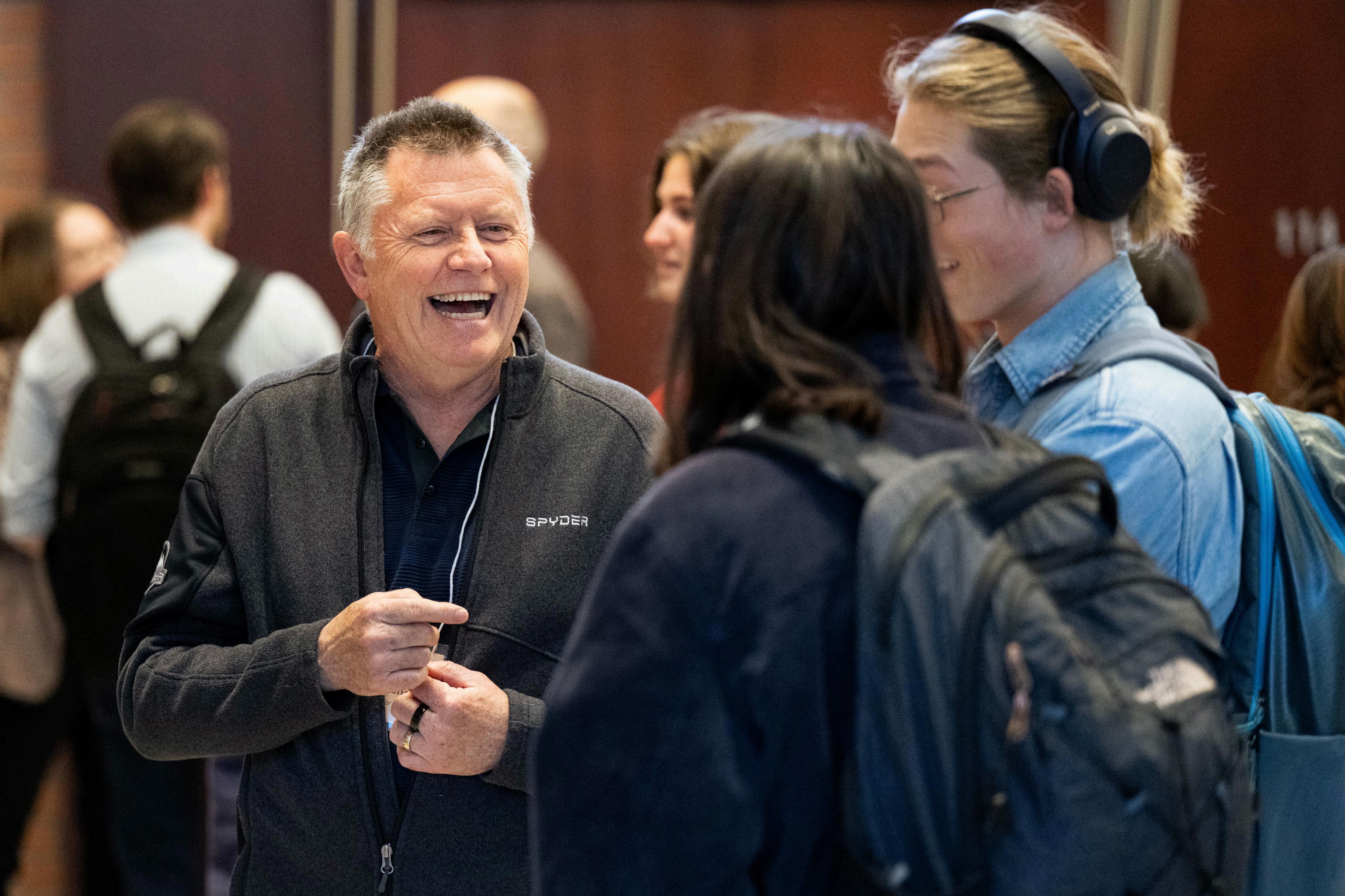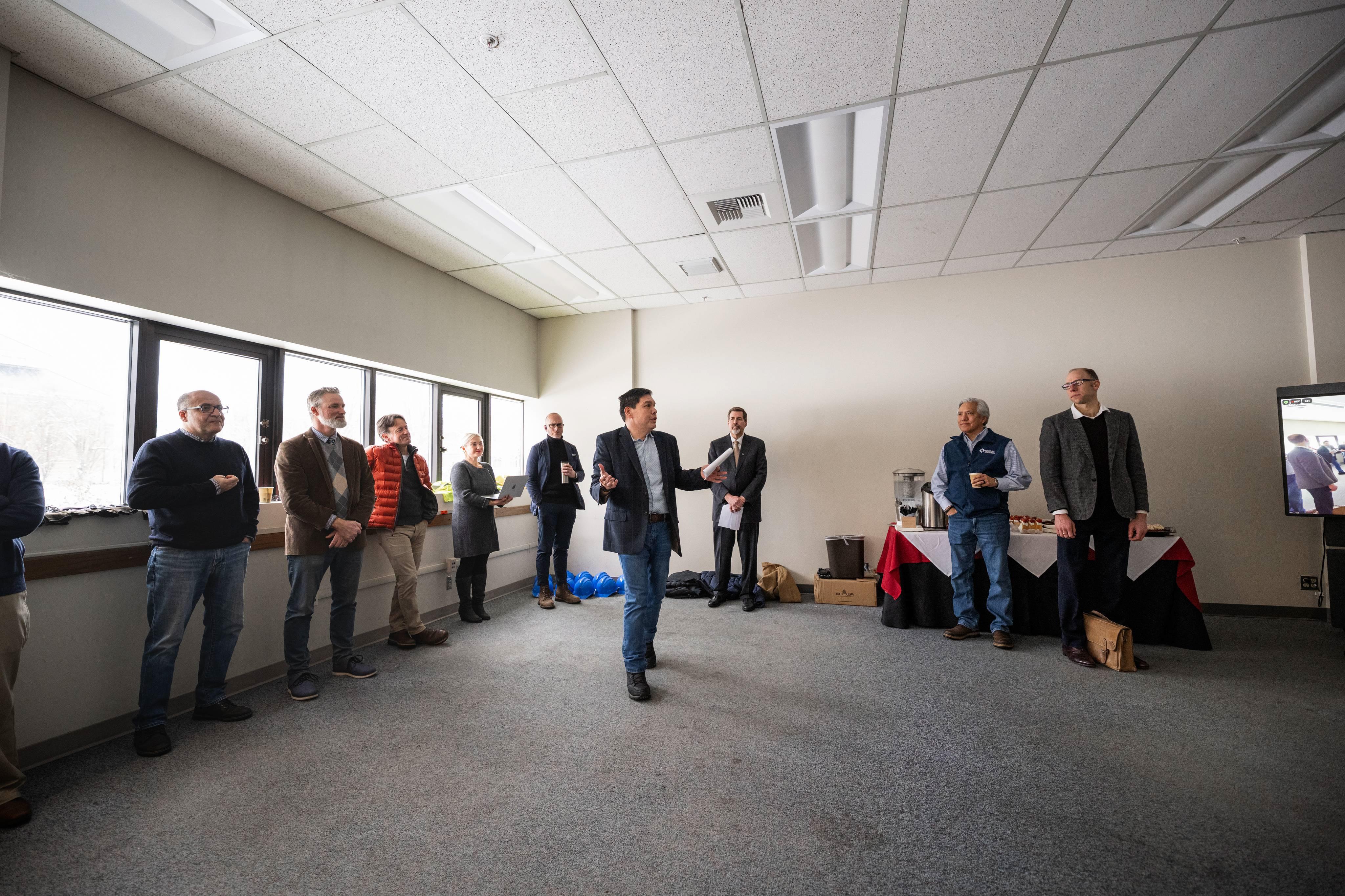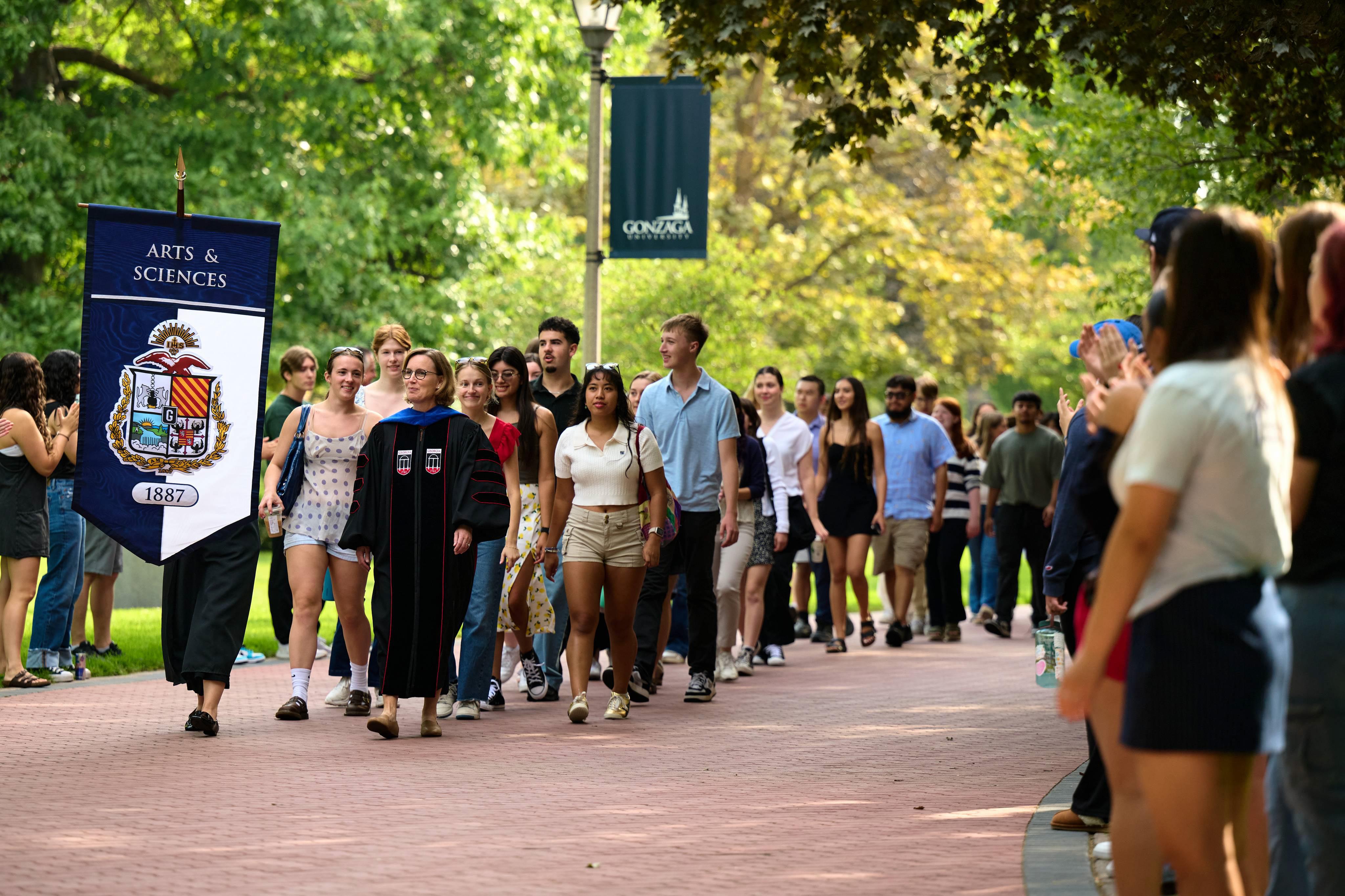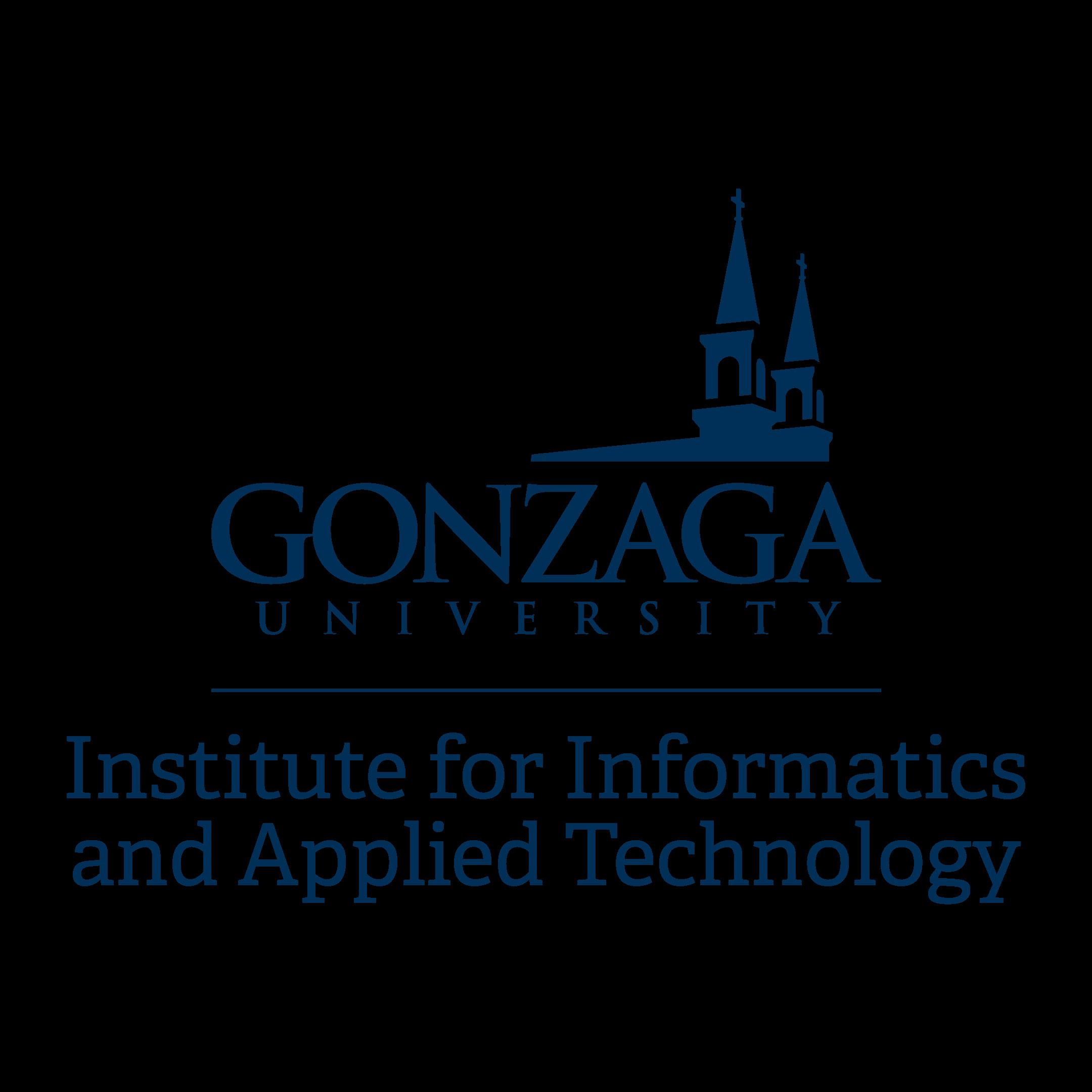THE TEAM
THE TEAM
Joining "Jay" are three full-time members of the Institute's team, bringing together industry expertise from media, finance, civil engineering and higher education.
Amy Hyde Marketing and Administration Specialist
Amy has led digital product and business transformation initiatives for major American media including AOL, Time Warner and The New York Times. She has developed go-to-market product and communication strategies for innovation centers and organizations in media, advertising and IT research.
Christopher Lopes AI Engineer
Chris has vast expertise developing web solutions within Microsoft's ecosystem, particularly in the financial sector, where he translated complex systems into thoughtful and efficient digital products. He brings his passion for development along with a dedication to quality and care toward the thoughtful integration of AI into applications.
Yanxia Wu AI Engineer
Shaped by interdisciplinary training in civil engineering (M.S.) and quantitative geography (Ph.D.) "Wu" is passionate about data in all forms — numbers, language, images and video — with a special interest in uncovering meaningful patterns across temporal, geographic and demographic dimensions.
From left to right: Jay Yang, Yanxia Wu, Amy Hyde, Christopher Lopes. Photo by Joshua Garcia
“Industries like aerospace manufacturing, healthcare, and computer engineering are all central elements of the Inland Northwest economy, and the Institute for Informatics and Applied Technology will create new opportunities for our students to be leaders in high-tech industries for years to come.”
- President Emeritus
Thayne M. McCulloh, D.Phil.
VISION
Gonzaga’s Institute for Informatics and Applied Technology envisions a bold future for higher education—where technical excellence and humanistic insight are inseparable and students across all disciplines are prepared to meet the rapid evolution of data and AI with agility, discernment and purpose.
MISSION
The Institute for Informatics and Applied Technology, guided by Jesuit principles, will establish Gonzaga as the university of choice for interdisciplinary, humanity-centered learning and innovation in informatics.
1
Visiting PHD Fellow
FOUNDATIONS
11
Affiliated Faculty
Grounded in Jesuit values and a commitment to human-centered innovation, the Institute for Informatics and Applied Technology advances its mission through three foundational elements, which reflect its integrated approach to learning, research, and partnership—each designed to foster responsible technological progress and real-world impact.
TRANSFORMATIVE LEARNING
In collaboration with Gonzaga’s deans, faculty, and staff, the Institute for Informatics is shaping informaticsinfused, Jesuit-guided learning experiences—from the core undergraduate curriculum to master’s and professional certificate programs—preparing leaders across disciplines to apply informatics and AI responsibly.
INTERDISCIPLINARY RESEARCH
The Institute is a catalyst for creative, interdisciplinary research that addresses real-world challenges in the development and application of responsible AI and informatics. Emphasizing agile research approaches that keep pace with technological change, the Institute supports faculty and student-led inquiry through mentorship and funding that expand scholarly impact.
COLLABORATIVE INNOVATION
The Institute’s Human-AI Collaboratory (HACLab) fosters solution-focused innovation through partnerships with industry, government, non-profits and educational thought leaders. Working alongside IIAT engineers and Gonzaga students, collaborators engage in creative ideation and development to solve realworld problems and advance the human condition.
FACULTY ENGAGEMENT
Arriving in August 2024, Dr. Yang started with conversation, not technology. Through one-on-ones, workshops, and surveys, he mapped faculty enthusiasm, curiosity, caution and concern. By identifying early adopters, supporting the cautiously curious and engaging skeptics respectfully—while honoring academic autonomy—he positioned the Institute as a trusted resource and catalyst for exploring how informatics and AI could shape each field.
CORE LEARNING OUTCOMES
These early faculty engagement efforts led to a collaboration with Core Director Ann Ciasullo to develop new AI and digital technology focused learning outcomes for Gonzaga’s core curriculum courses: COMM 100, PHIL 101 and ENGL 101. The new outcomes address topics such as the responsible use of digital tools, the potential for algorithmic bias, discerning when and how to use AI in writing and literacy practices and the ethical issues concerning reasoning and argumentation in the age of AI. In partnership with Instructional Design & Delivery and Foley Library, the Institute for Informatics developed a summer workshop that brought together more than thirty faculty members to explore the technical foundations of AI and help shape each department’s unique approach to these outcomes, which will debut in the Fall semester 2025.
NEW PROGRAM DEVELOPMENT
While Gonzaga’s integrative approach to informatics and AI led to the creation of the Institute and a number of key collaborations, it has also revealed the need for entirely new programs and courses. Beginning in Fall 2025, Gonzaga will launch several new offerings, including:
• AI in Leadership Certificate (Center for Lifelong Learning)
• M.S. in Data Science (School of Engineering and Applied Science)
The Institute is also actively assessing additional programs that will position Gonzaga as a leader in interdisciplinary informatics. Current programs under consideration include:
• Cyber Resilience
• Sports Analytics
• Bio/Health Informatics
ZagAI: GONZAGA'S AI-POWERED LEARNING ASSISTANT
As part of its commitment to fostering ethical and innovative uses of emerging technologies, the Institute for Informatics and Applied Technology is piloting ZagAI —a custom-built AI learning assistant designed to support both instructors and students. ZagAI prioritizes data privacy, transparency in AI use, student experience research and trust, aligning with the unique needs of Gonzaga's academic community.
ZagAI is built not just as a tool, but as a platform for responsible innovation. It assists students in navigating complex assignments through techniques like Socratic questioning, encourages deeper reflection, supports faculty in enhancing instruction and serves as a living system for ongoing research into how AI can meaningfully support learning without replacing human insight.
The project is led by English Professor Chase Bollig, MIS Professor Shan Xiao, AI Engineer Chris Lopes and student researcher Izzy Tilles, with an initial product release in mid-July. Students will begin using ZagAI in the second summer session, with formal introduction in ENGL 101 this fall.
ZagAI isn’t just about adopting AI—it’s about shaping it, together.
APPROACH
The Institute for Informatics and Applied Technology advances knowledge, enhances teaching, and drives economic growth through interdisciplinary research. Supported by government grants, private sponsors and Gonzaga funding, faculty and students explore emerging technologies and their impacts on education, work, society and the human experience. Research initiatives reflect Gonzaga’s Jesuit tradition, emphasizing care for the vulnerable, solidarity, and environmental stewardship.
A PHILOSOPHICAL SURVEY OF RESPONSIBLE AI
Principal Investigator: Dr. Anthony Fisher, Philosophy
In the age of AI, universities and industry readily advocate for ‘responsible AI’. Google and Microsoft, for example, have responsible AI labs that hold the view that people should develop and deploy AI technologies in a responsible way. However, it is not clear that there is any consensus on what "responsible AI" amounts to. Through surveying the disparate work on responsible AI across fields, from ethical discussions about responsibility in moral theory to the responsible implementations of AI in the commercial market, this research clarifies ambiguities in responsible AI and draws distinctions among senses and kinds of responsibility that carve up the topic in illuminating ways. This work will help shape an actionable responsible AI framework for organizations as society continues to advance and adopt AI technologies. A conference on the ethics of responsible AI will be organized as an opportunity to bring academics from philosophy and computer science together, alongside experts in Industry.
QUANTIFYING HOW VISUAL AND SEMANTIC SIMILARITY INFLUENCE VISUAL SEARCH FOR REAL-WORLD OBJECTS
Principal Investigator: Dr. Doug Addleman, Psychology
IIAT AI Engineer: Yanxia Wu
IIAT Student Researcher: Zobe Murray
This research aims to inform the development of a quantitative tool using machine learning that can assist in identifying visual and semantic similarities between images. For example, searching for a snail might be made more difficult by introducing visually similar distractors like cinnamon rolls or semantically similar ones like seahorses. This approach will inform theories about the role of visual features and semantics in visual attention that will be of interest across a range of fields in cognitive and computer science (visual neuroscience, the development of conceptual knowledge during childhood, computer vision and more).
LEADERSHIP FOR AI ADOPTION
Principal Investigator: NIla Hoxha, Ph.D.Candidate, Leadership Studies
IIAT Mentor: Jay Yang
An investigation into how leadership styles shape the adoption, integration and responsible use of artificial intelligence in organizational settings through the analysis of leadership frameworks such as transformational, servant and transactional leadership in AI implementation.
PROPOSAL STAGE RESEARCH
• Transforming K-12 Education in the AI Era
• Provenance for Retrieval Augmented Generation
• Generative AI Energy Meter
• Turing Test for Decision Making in the AI Era
Gates Foundation AI For Instruction Fellowship
Principal Investigator: Anny Case with Jay Yang
City of Spokane - Smart Intersection and Digital Twins
Funded by the Gates Foundation AI For Instruction Fellowship, Gonzaga’s School of Education and IIAT have partnered to explore how K–12 educators can ethically and effectively integrate artificial intelligence into classroom instruction. Rooted in the Gates Foundation’s strategic commitment to academic improvement, equity and charter sector sustainability, the Fellowship program aims to position educators as instructional leaders in the ethical use of AI while enabling cross-sector partnerships to solve real-world challenges in education. In conjunction with the Fellowship training (a "boot camp", monthly coaching, learning labs and capstone showcase), the project’s principal investigators will conduct research to collect and assess participating teachers’ and students’ reflections on the programs intended outcomes. The research findings and lessons learned will be disseminated at the conclusion of the project.
With pedestrian injuries and fatalities on the rise, the City of Spokane and the Institute for Informatics and Applied Technology are exploring how artificial intelligence can be leveraged to enhance traffic safety and efficiency. This early stage collaboration brings together machine learning researchers, data scientists, city engineers, and law enforcement to test and learn how digital twin technology can improve safety at high-risk intersections.
Principal Investigator: Yanxia Wu with Jay Yang
Photo by Joshua Garcia
Impactful Partnerships
At the Institute for Informatics and Applied Technology (IIAT), innovation happens through collaboration. Partnerships with industry, government, non-profits and other universities push the outer limits of emerging technologies while staying grounded in the IIAT vision for responsible AI and informatics for the benefit of society.
IIAT works with partners who share the belief that technology should serve people. Together, we design projects that challenge assumptions, explore untested possibilities and address the ethical, social and technical questions that shape the future. From AI's environmental impacts to tools that expand educational access, each initiative balances bold exploration with human-centered responsibility.
For Gonzaga students, these collaborations are immersive, real-world learning experiences. Working alongside partners, they tackle complex, open-ended problems that require technical skill, interdisciplinary thinking and a deep awareness of societal impact. This hands-on approach prepares them to lead in shaping technology’s role in the world.
IIAT's projects deliver tangible benefits—supporting economic development, addressing social challenges and fostering inclusive technological ecosystems. Guided by Gonzaga’s Jesuit values, IIAT unites ambition with accountability, proving that innovation can be both a driver of progress and a force for the common good.
To explore partnership opportunities with IIAT, email informatics@gonzaga.edu
ADVISORY COUNCIL
A NEW APPROACH TO ADVISORY ENGAGEMENT
The Institute for Informatics and Applied Technology, in collaboration with University Advancement, Jeff Geldien, Ph.D., and Advisory Council Chair Dave Reisenauer, has developed a forward-looking model for advisory engagement—one that may serve as a template for other councils across Gonzaga.
The IIAT Advisory Council is composed of strategic leaders from higher education, technology, energy, consulting and entrepreneurship. Council members serve three-year terms and offer guidance to Dr. Yang, mentorship to students and support to Institute staff as we work together to shape the future of interdisciplinary informatics and responsible AI.
ADVISORY COUNCIL MEMBERS
Dave Reisenauer, Chair - Nvidia, IBM (retired)
Dave Lubowe, Ernst & Young
Florence Hudson, Columbia University
Jennifer Halverson, Accenture
Keith Lucas, Author & Entrepreneur
Kevin O'Toole, Google
Michael Smith, Carnegie Mellon University
Mike Moniz, Circadence Corp
Steve Hastings, Cognitiv
Wayne Manuel, Avista (Joining Fall 2025)
Advisory Council Chair Dave Reisenauer engaging with students at the Value and Responsibility in AI Conference.
OPENING DOORS AND MINDS
From conversations to new carpet, the 2024-2025 academic year literally laid the groundwork for the Institute's programs and research. The second year promises even more opportunity.
PARTNERSHIPS
Through partnerships, IIAT can co-create solutions, deliver tailored workshops and develop projects that serve your organization and strengthen shared commitments to innovation with purpose
GRANTS & FUNDRAISING
Your organization's grants and philanthropy can fuel groundbreaking research, empower students and shape technology for the common good.
Your support is appreciated!
MONTHLY GIVING PROGRAM
Automatic monthly gifts are convenient for you and provide IIAT with reliable support year-round.
ASSETS
Gifts of stocks, bonds, and mutual funds.







